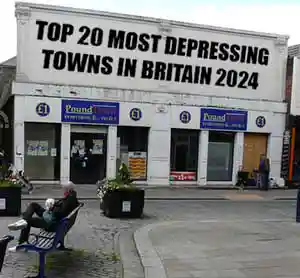Is Shelton in Rushcliffe a nice place to live or is it a bit rough? We have collated a series of socio-economic statistics and demographics from UK government sources such as the 2021 Census and the Index of Multiple Deprivation. They should give you a broad snapshot of the area and the surrounding locations. Are the residents of Shelton older than the national average or younger? What is the population of Shelton and Rushcliffe? What is the claimant count in Shelton and how many residents are unemployed? This page should provide you with the answers.What are the occupations of the residents of Shelton?
The largest employment sector in Shelton is Managers, Directors & Senior Officials. The smallest employment sector is Process Plant & Machine Operatives.| Sector | Proportion |
|---|
| Managers, Directors & Senior Officials | 24.42% |
| Professional Occupations | 23.56% |
| Associate Professional & Technical | 12.67% |
| Skilled Trades | 11.43% |
| Administrative & Secretarial | 9.18% |
| Caring, leisure & Other Services | 5.37% |
| Elementary Occupations | 4.98% |
| Process Plant & Machine Operatives | 3.27% |
Shelton Health Statistics
Thoroton has significantly more residents (>5%) describing their health as very good than the national average for England.| Area | VG | G | F | B | VB |
|---|
| Thoroton | 53.63% | 32.29% | 11.11% | 2.33% | 0.64% |
| Rushcliffe | 53.1% | 32.03% | 11% | 3.05% | 0.82% |
| East Midlands | 46.25% | 34.83% | 13.58% | 4.16% | 1.19% |
| England | 48.49% | 33.71% | 12.65% | 3.98% | 1.17% |
VG = Very Good, G = Good, F = Fair, B = Bad & VB = Very Bad
How has the health of residents in Rushcliffe changed since 2011?
Rushcliffe residents who describe their health as either good or very good has increased by 0.63% between the 2011 and 2021 census.| Year | VG | G | F | B | VB |
|---|
| 2011 | 51.91% | 32.59% | 11.5% | 3.12% | 0.87% |
| 2021 | 53.1% | 32.03% | 11% | 3.05% | 0.82% |
VG = Very Good, G = Good, F = Fair, B = Bad & VB = Very Bad
How many residents own or rent their home in Shelton and Rushcliffe
We have taken the raw data from the 2021 census and calculated what proportion of people in Shelton either own or rent their home. All percentages have been rounded to two decimal places. 81.24 of residents own their home either outright or mortgaged. 18.76 of Shelton residents rent their home either privately or through a social landlord. | Area | Owned | Rented |
|---|
| Thoroton | 81.24% | 18.76% |
| Rushcliffe | 75.7% | 24.3% |
| East Midlands | 65.47% | 34.53% |
| England | 61.31% | 38.69% |
Shelton has a significantly higher level of home ownership than the national average. This is indicative or an economically wealthy area.
Shelton compared to other wards in Rushcliffe
| # | Ward | Owned | Rented |
|---|
| 1 | Tollerton | 91.71% | 8.29% |
|---|
| 2 | Bunny | 88.12% | 11.88% |
|---|
| 3 | Nevile & Langar | 86.27% | 13.73% |
|---|
| 4 | Compton Acres | 82.77% | 17.23% |
|---|
| 5 | Keyworth & Wolds | 82.15% | 17.85% |
|---|
| 6 | Radcliffe on Trent | 81.61% | 18.39% |
|---|
| 7 | Thoroton | 81.24% | 18.76% |
|---|
| 8 | East Bridgford | 80.24% | 19.76% |
|---|
| 9 | Cranmer | 79.82% | 20.18% |
|---|
| 10 | Abbey (Rushcliffe) | 79.59% | 20.41% |
|---|
| 11 | Gotham | 79.35% | 20.65% |
|---|
| 12 | Leake | 79.31% | 20.69% |
|---|
| 13 | Musters | 78.68% | 21.32% |
|---|
| 14 | Gamston South | 77.14% | 22.86% |
|---|
| 15 | Sutton Bonington | 76.8% | 23.2% |
|---|
| 16 | Bingham East | 76.41% | 23.59% |
|---|
| 17 | Lady Bay | 75.94% | 24.06% |
|---|
| 18 | Cropwell | 75.61% | 24.39% |
|---|
| 19 | Ruddington | 73.81% | 26.19% |
|---|
| 20 | Cotgrave | 71.77% | 28.23% |
|---|
| 21 | Bingham West | 70.13% | 29.87% |
|---|
| 22 | Gamston North | 68.86% | 31.14% |
|---|
| 23 | Edwalton | 68.05% | 31.95% |
|---|
| 24 | Lutterell | 66.02% | 33.98% |
|---|
| 25 | Trent Bridge | 48.33% | 51.67% |
|---|
Shelton is ranked 7 out of 25 wards in Rushcliffe for the percentage of home owners.Shelton & Rushcliffe Immigration Statistics
We have analysed the Census 2021 raw data on country of birth and compiled immigration statistics as percentages of the population. All percentages have been rounded to two decimal places. Below are the figures for Shelton in the Rushcliffe local area district.
Shelton has a lower rate of immigrants than Rushcliffe, the East Midlands region and England as a whole. | Area | Born in UK | Born outside UK |
|---|
| Thoroton | 96.51% | 3.49% |
|---|
| Rushcliffe | 91.69% | 8.31% |
|---|
| East Midlands | 86.28% | 13.72% |
|---|
| England | 82.65% | 17.35% |
|---|
Shelton compared to other wards in Rushcliffe
| # | Ward | Born in UK | Born outside UK |
|---|
| 1 | Compton Acres | 81.03% | 18.97% |
|---|
| 2 | Lutterell | 84.35% | 15.65% |
|---|
| 3 | Edwalton | 85.79% | 14.21% |
|---|
| 4 | Trent Bridge | 86.23% | 13.77% |
|---|
| 5 | Gamston South | 87% | 13% |
|---|
| 6 | Musters | 87.59% | 12.41% |
|---|
| 7 | Sutton Bonington | 88.02% | 11.98% |
|---|
| 8 | Gamston North | 88.5% | 11.5% |
|---|
| 9 | Abbey | 89.58% | 10.42% |
|---|
| 10 | Lady Bay | 90.25% | 9.75% |
|---|
| 11 | Tollerton | 93.12% | 6.88% |
|---|
| 12 | Radcliffe on Trent | 93.85% | 6.15% |
|---|
| 13 | Bunny | 94.18% | 5.82% |
|---|
| 14 | Ruddington | 94.42% | 5.58% |
|---|
| 15 | Keyworth & Wolds | 94.68% | 5.32% |
|---|
| 16 | Cranmer | 94.79% | 5.21% |
|---|
| 17 | Leake | 94.9% | 5.1% |
|---|
| 18 | Bingham West | 94.91% | 5.09% |
|---|
| 19 | Bingham East | 95.33% | 4.67% |
|---|
| 20 | Cotgrave | 95.33% | 4.67% |
|---|
| 21 | Gotham | 95.67% | 4.33% |
|---|
| 22 | East Bridgford | 95.89% | 4.11% |
|---|
| 23 | Nevile & Langar | 96.1% | 3.9% |
|---|
| 24 | Thoroton | 96.51% | 3.49% |
|---|
| 25 | Cropwell | 96.61% | 3.39% |
|---|
';Shelton is ranked 24 out of 25 wards in Rushcliffe for the number of residents born outside of the UK.Shelton Unemployment Statistics
Since the introduction of Universal Credit, The Department for Work & Pensions have not issued any statistics (in our view) that can be used to ascertain the levels of unemployment or under employment in the UK, just meaningless geographic counts. However, the Office of National Statistics does publish claimant counts of people receiving out of work benefits, be that legacy Jobseeker’s Allowance or Universal Credit as a proportion of people over 16. These figures are usually updated once a month and are for Local Authority Districts and Unitary Authority Districts. So below are the figures of Rushcliffe.| Area | Unemployed | Yearly Change |
|---|
| Rushcliffe | 1.8% | -0.1% |
| East Midlands | 3.4% | -0.2% |
| England | 3.8% | -0.3% |
| UK | 3.7% | -0.3% |
| Economic Status | Proportion |
|---|
| In Employment | 61.03% |
| In Part-Time Work | 29.24% |
| Unemployed | 2.01% |
Shelton Age Distribution Statistics
We have taken the raw data from the 2021 Census and the calculated the proportion of age groups in Thoroton.| Age Band | Proportion |
|---|
| 4 & under |  |
| 5 - 9 years |  |
| 10 - 15 years |  |
| 16 - 19 years |  |
| 20 - 24 years |  |
| 25 - 34 years |  |
| 35 - 49 years |  |
| 50 - 64 years |  |
| 65 - 74 years |  |
| 75 - 84 years |  |
| 85 years & over |  |
Shelton Education Statistics
We have taken the raw data from the 2021 census to found of the level of education Shelton residents have in terms of formal qualifications as a percentage. The UK government breaks qualifications down into 7 levels. A detailed explanation of these levels can be found here. However, the Census groups these into just 4 \'levels\'. Here are some examples of the qualifications each census level represents when not stated;
- Level 1 - GCSE grades D, E, F, or G & below
- Level 2 - GCSE A*, A, B, C or O Level grades A, B or C
- Level 3 - A or AS qualification at any grade
- Level 4 - HNC, Bachelors Degree, Masters Degree or Phd
In this first table we have compared Shelton to the national average for England.
| Level | Thoroton | England |
|---|
| No Qualifications | 9.69% | 18.08% |
| Level 1 | 8.2% | 9.69% |
| Level 2 | 13.77% | 13.32% |
| Apprenticeship | 4.84% | 5.32% |
| Level 3 | 18.03% | 16.92% |
| Level 4 | 44.03% | 33.92% |
What is the population of Shelton and Rushcliffe?
The table below contains the populations figures for each ward in Rushcliffe including Shelton. These population ONS figures are estimated are dated Mid 2020.
| Ward | Population |
|---|
| Abbey | 5464 |
| Bingham East | 5314 |
| Bingham West | 5035 |
| Bunny | 2567 |
| Compton Acres | 5692 |
| Cotgrave | 8299 |
| Cranmer | 3293 |
| Cropwell | 2487 |
| East Bridgford | 3086 |
| Edwalton | 5384 |
| Gamston North | 2635 |
| Gamston South | 2662 |
| Gotham | 2431 |
| Keyworth & Wolds | 7997 |
| Lady Bay | 5757 |
| Leake | 8985 |
| Lutterell | 6161 |
| Musters | 5312 |
| Nevile & Langar | 2617 |
| Radcliffe on Trent | 8266 |
| Ruddington | 7913 |
| Sutton Bonington | 2041 |
| Thoroton | 2900 |
| Tollerton | 2518 |
| Trent Bridge | 6600 |
| Rushcliffe Total | 121416 |
Last updated: 20/02/2024, Additional Sources: Office for National Statistics & Department for Work & Pensions.














